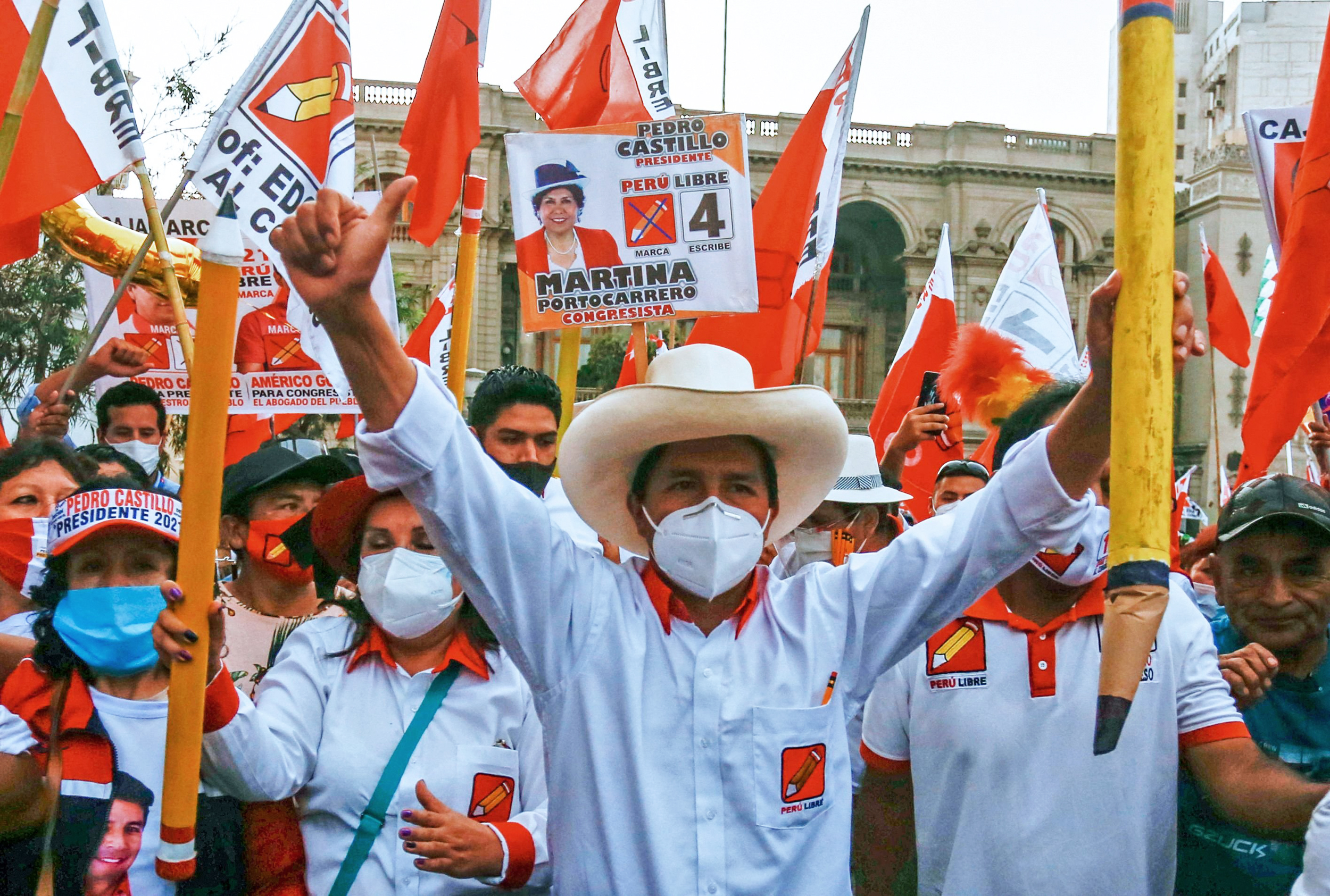
(Argus, 22.Apr.2021) — Peru could nationalize natural gas and mining assets if little-known presidential candidate Pedro Castillo wins a 6 June run-off ballot.
Castillo, a far-left rural school teacher who favors greater state control over natural resources and strategic industries, enjoys a healthy lead over Keiko Fujimori, his populist rival who espouses a stronger private-sector role.
Castillo has 41pc support compared with 26pc for Fujimori, according to a poll by Datum International published today. But the survey found 33pc of Peruvian voters are still undecided or willing to cast a blank or spoiled ballot.
Top pollster Ipsos Peru gave Castillo 43pc compared to 31pc for Fujimori in a poll released on 18 April. The remaining voters were undecided. Voting in Peru is mandatory.
Early attention has focused on Castillo’s Peru Libre party, which calls for sweeping changes to the country’s economic and political model, starting with a new constitution.
The party platform, issued in 2019 before Castillo was a candidate or even a party member, calls for nationalizing mining and hydrocarbon assets, as well as power plants. It would examine investment and tax-stability agreements, and review nearly 20 free-trade agreements, including those with China, the US and the EU.
Peru is the world’s second largest copper producer. Mining is the top source of foreign investment and export revenue.
Such policies would turn Peru inward and alienate many foreign investors that have an extensive presence across energy and mining. Peru is a member of the export-oriented Pacific Alliance along with Chile, Colombia and Mexico. Neighboring Ecuador, which just elected center-right former banker Guillermo Lasso, will now likely join the group as well.
Peru is South America’s only LNG exporter, based on its Camisea gas fields operated by Argentina’s Pluspetrol. The 4.4mn t/yr liquefaction complex at Pampa Melchorita is operated by US firm Hunt Oil.
Castillo has refrained from interviews, but told supporters on 13 April, shortly after advancing to the run-off, that “strategic resources would be recovered for Peru. “Camisea gas will be for Peruvians, it has to be nationalized,” he said.
Castillo, virtually unknown until February, favors a new constitution, but has said would put the decision to a referendum. On paper the process would be similar to neighboring Chile’s current effort to elect a constituent assembly to redraft its 1980 constitution. But local media has focused on constitutional overhauls that ushered in long-serving leftist governments in Bolivia and Venezuela, where private investment has largely dried up.
Fujimori, head of the Fuerza Popular party, compares Castillo to Venezuela’s president Nicolas Maduro and denounced Bolivia’s former president Evo Morales after he tweeted support for Castillo. Playing to the fears of the business community, she claims Castillo’s Peru would look like North Korea.
Generation shift
Business executives recoil at Fujimori’s corruption record, but some say privately she is the lesser of two unappealing choices. The national manufacturers’ association says it has requested a meeting with both candidates to evaluate proposals, but most groups are taking a wait-and-see approach for now. Among conservatives, Alberto Fujimori’s administration is still admired for stabilizing the country, cracking down on the Shining Path, a rural Maoist movement, and embarking on an aggressive privatization campaign, including upstream and downstream oil assets.
Daughter of former president Alberto Fujimori (1990-2000) currently serving a 25-year sentence in a human rights case, Fujimori faces a pending trial on asset laundering from her first presidential run in 2001, when she received undeclared cash contributions, including $3.6mn from the former chairman of Peru’s largest bank. She spent more than two years in pre-trial detention, and was only released a year ago because of the Covid-19 pandemic.
Peru’s vaccination campaign has barely gotten off the ground under interim president Francisco Sagasti, an intellectual caretaker who took over late last year following a period of political turmoil.
____________________
By Lucien Chauvin and Patricia Garip

